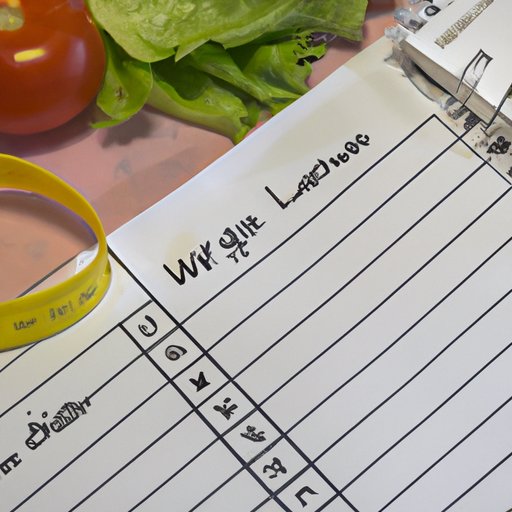
Introduction
Losing weight is a common goal for many people around the world. With so much information out there on different diets, it can be overwhelming to find the right approach for you. The truth is that a quick and temporary weight loss may be achieved through fad diets or extreme calorie restriction. However, without a sustainable approach like long-term lifestyle changes, weight loss will be difficult to maintain. That’s where a good diet comes in. In this article, we explore the key components of a good weight loss diet.
Defining a Good Diet: The Key Components for Sustainable Weight Loss
A good diet is crucial for effective weight loss, but what does that mean exactly? In a nutshell, it is a way of eating that promotes health, fuels your body with the energy it needs, and helps maintain a healthy weight. It’s not about deprivation or crash diets, but rather balance, moderation, variety, and nutrient-density.
Balance: A good diet includes all food groups in appropriate amounts, including fruits, vegetables, whole grains, lean proteins, and healthy fats.
Moderation: A good diet allows for treats in moderation so that you don’t feel deprived and tempted to binge eat later.
Variety: Incorporating a variety of foods helps ensure that you get all the essential nutrients your body needs.
Nutrient-density: Nutrient-dense foods provide the most nutrition for the least amount of calories, making them an ideal choice for weight loss.
Losing Weight with a Nutrient-Dense Diet: What to Eat and What to Avoid
When it comes to weight loss, choosing nutrient-dense foods is essential. Nutrient-dense foods are low in calories but high in nutrients, helping you feel full even when you’re eating fewer calories. Examples of nutrient-dense foods include fruits, vegetables, whole grains, lean proteins like chicken and fish, and healthy fats like nuts and avocados.
On the other hand, it’s important to limit or avoid foods that are high in calories but low in nutrients, like fast food, processed snacks, and sugary beverages. These types of foods can add up quickly in calories and can sabotage your weight loss efforts.
The Link Between Food and Weight: Creating a Meal Plan for Effective Weight Loss
Meal planning can be an effective tool when trying to lose weight. It helps you stay organized and make healthier choices, rather than relying on last-minute decisions that could lead to bad food choices. When it comes to meal planning, plan out meals that include a variety of foods from all food groups, make sure they are nutrient-dense, and consider portion sizes.
Portion sizes are important to consider. Overeating, even on healthy foods, can lead to weight gain. When it comes to meal planning, using measuring cups or a food scale to ensure you’re eating appropriate portions can be helpful.
Cutting Calories? Look Beyond the Numbers When Choosing Foods for Your Weight Loss Diet
It’s a common belief that weight loss simply comes down to calorie-counting. However, this isn’t entirely true. The quality of your calories matters just as much as the quantity. It’s important to choose foods that are filling and satisfying to avoid feeling hungry and deprived. Plan meals that include a variety of fibrous vegetables, lean proteins, and healthy fats. These foods are nutrient-dense and will help keep you full for longer periods of time.
Going Beyond Weight Loss: How a Good Diet Can Improve Your Health and Well-being
While losing weight is a popular reason to start a good diet, there are many other benefits. A diet high in nutrient-dense foods can improve energy levels, mood, mental clarity, blood sugar levels, and even prevent chronic diseases like diabetes, heart disease, and cancer. When we focus on quality choices rather than just counting calories, it positions the body to function at its highest level of health.
Top Foods You Should Eat as Part of a Healthy Weight Loss Diet
There are many foods that are particularly beneficial for weight loss and overall health. Some of these include:
– Fruits: Berries are a great choice because they’re low in calories and high in fiber. Apples and bananas are also easy to find and make great snack choices.
– Vegetables: Dark leafy greens, such as kale and spinach, are packed with nutrients. Broccoli and peppers are also great options.
– Whole Grains: Quinoa, brown rice, and whole-grain bread and pasta are great options.
– Lean Proteins: Chicken, fish, and tofu are all lean protein choices.
– Healthy Fats: Nuts, seeds, avocados, and olive oil are all healthy fats that can help maintain feelings of fullness.
Conclusion
A good diet is not about depriving oneself of tasty foods for the sake of losing weight. Instead, it’s about approaching weight loss from a well-balanced and sustainable perspective. Incorporating nutrient-dense foods, portion control, and meal planning can all contribute to a successful and long-lasting weight loss journey. Remember, a good diet is the foundation for overall health and well-being. Start small and incorporate new habits slowly to give yourself the best chance to succeed.




